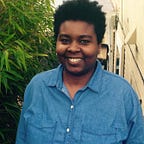Rediscovering Black Joy in Nature This Year
I find joy knowing that there are many that experience Black joy in nature despite the myth and despite the concerted efforts to silence us. This Black joy, this resistance, and the ability to breathe with nature is what I hope to lean more and more into as a Black nature writer.
Nature hears our cries,
the resilience,
the woodpecker pokes
through dimmed light,
sustenance
Black nature stories
appear like seabirds
in troubled waters,
under surface,
needing to breathe
Biodiversity a myth
in human plains?
We’ve acclimated
to environmental mythology,
lies that Black ancestors
ain’t sang
in unison
with nature…
Growing up, I didn’t seek to be a Black nature writer. I have experienced the evocation of autumn in Robert Frost poems, a poem collection my dad kept on our coffee table. In them, I found joy in the mundane and was intrigued by the messages that landscapes show us if we just look closer. As a Black girl, I found no separation between me and the landscapes, the autumn leaves, and the natural world. That is what environmentalism doesn’t tell us — that the assumption that embracing nature is “The Road Not Taken[1]” for Black people is a myth. I don’t hear this myth from the Northern Cardinals that peeked through my windows on the west side of Chicago as a child, or the snow that blanketed my concrete streets, welcoming my footprints and snowman sculptures. Lake Michigan gave me brisk breezes to interrupt muggy summer nights on its shores. My Blackness has felt comfortable with nature, and I’ve breathed in reciprocity. But this ability to breathe, the freeness that enveloped my childhood imagination while reading Frost poems, urges my nature writing — my Black nature writing.
For a period of time, I resisted the urge to write about the beauty of nature, insisting that the hidden truths be at the forefront of my writing. And it has been a long time since I have read a Robert Frost poem. I have always loved to write about nature, one of my first poems as a child being about the sun. But as a Black writer, the more I learned, the more I lost. I learned the myths of the pristine wilderness, the myth that many nature writers harken back to. History lessons aren’t fun when you see your ancestors as the oppressed — that one story of pristine wilderness meant enslavement and land theft for another. I’ve also learned about the stories pressing up against the myths: the resilience stories and the triumphs above the silencing and oppression. Awakening for me, a Black aspiring nature writer, means a mash of pride, horror, joy, disgust, sorrow, and trauma. Realization is that the lack of Black representation in the environmental realm is not one of scarcity and is, instead, one of concerted effort to keep the environmental myths of the pristine running. And this year, I have been rethinking my writing — rethinking what resistance looks like for me in nature writing. As Black people, we have always been more than the oppression we face. And nature, at least, is on our side.
As I have taken the time to look closer at nature, it has taught me so much and given me so much healing: the butterflies that spent so much time on my patio, the gull that flew in the wildfire smoke as I looked out my window in despair, and the Steller’s Jays that provide comedy for me on my daily walks. Nature tells me that I am welcome — that my Black life matters. Nature knocks at my windows and provides morning songs. Nature tells me that white dominated environmentalism stories are myths — that my experiences as a Black woman are welcome and real. I find joy knowing that there are many that experience Black joy in nature despite the myth and despite the concerted efforts to silence us. This Black joy, this resistance, and the ability to breathe with nature is what I hope to lean more and more into as a Black nature writer.
[1] Robert Frost Poem “The Road Not Taken”
